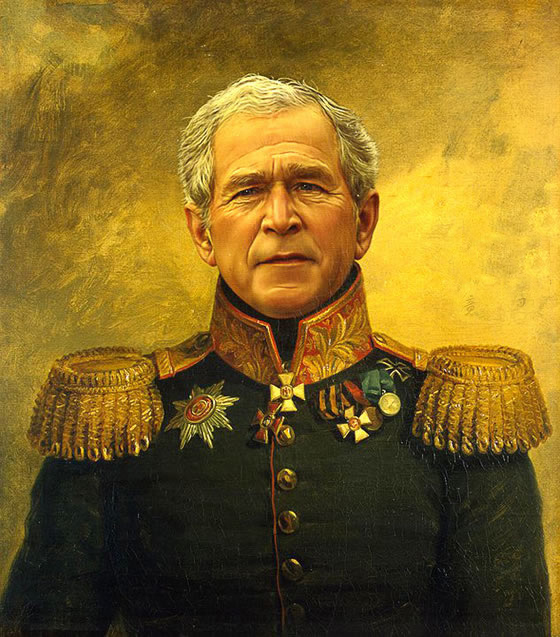
The Urban Fox
And Other Poems
Ian Dunlop
(Pækakariki Press)

We are always impressed when a leader in one field decides, one dreamy day, to throw it all up and become an artist. Like George Bush deciding after compromising our country's relative peace and security, leaving us bristling with wars in some far-off ash-pit of a country; he merrily fades away into the Texas Hill country, spending his waning days pooping out dozens of pix of fluffy doggies, fluffy trees, and fluffy world leaders - - - including George Bush I (and II and Vladimir Putin!) - - - many referred to, of course, as "Portraits of Courage."Well, this Ian Dunlop decided to do somewhat the same. No, no: I don't mean going from waterboarding to watercolor. Rather, Dunlop went from being a noted critic for the Evening Standard, specializing in the likes of Van Gogh and Edgar Degas, to now, in his golden years, putting out verse in the school, perhaps, of Edward Thomas.
Or not, when you consider some of his poems include rants about Dylan ("the audience brought out their zippos / and light flames to light on the road alone") or the Stones at Shea . . . where "a wall or sound was formed / which must have made the angels dance in heaven."
Now those of us who don't necessarily conjoin Mick with the godly folk might see Dunlop's poetry not so much as clone of "two poets among many I admire," being Frost and Larkin. Still there is something to be said for the rich nostalgia that interlards the twenty poems here.
Dunlop does have some difficulty with what many of us look for in poetry: accuracy, a certain precision, a bit of jazz (or, for some, plainsong). Still, if you had happened to be - - - as I was - - - a half a century ago, there in the south of France, you might have experienced the thing . . .
The thing about the South of France
is that it is, or was, so goddamn sexy.
The air smelt of pine trees,
thyme, rosemary and wild herbs,
the sea was warm and inviting.Those of us who might be looking for the music of poetry might find that "so goddamn sexy" might not reflect the artful crudeness of Larkin, for the latter has a certain, shall we say, élan not to say a certain raw rhythm:
Sexual intercourse began
In nineteen sixty-three
(which was rather late for me) ---
Between the end of the Chatterley ban
And the Beatles' first LP.
Our thought is that if Dunlop is going to put out a book of poetry, it would behoove him to exercise the precision that is the hallmark of an experienced writer, the kind of exactitude that he presumably used in his books and articles when detailing art. At those times that he ventures into the plastic arts here in The Urban Fox his precision is as it should be:
We met in the Brancacci chapel
where we gazed up
at the frescos by Masaccio
and wondered why Adam shields his eyes
and not his nakedness.§ § § There is no sin in self-publishing, it has a rich and honored history: Alexander Pope, T. S. Eliot, Shelley, Walt Whitman, E. E. Cummings, Carl Sandburg. And Dunlop gets points for putting out a brief if elegant volume, complete with delicate drawings, fine binding (delicate thread in the interstices), using hot type and superb cover stock. His poems of nostalgia can touch our hearts, his journeys into Andalusia, where he and his friends were named the "Lánguidos muchachitos" - - - the languid kids - - - "reading our Durrell and our Brenan, / hoping to find our own Justine."
A matador arrives, carrying the bloody "ears, hooves, and even a tail," but even more wondrous, "a famous author . . . the one I most admired," arrives,
With his grey hair and beard, broad chest,
face burnt by the sun and
battles with men, women, booze.Dunlop is kind enough not to name-drop and we are with him, in the split decision as to whether to stay on in hopes of spending some time with this god-like figure, or having to leave because the "call from home announced the death of my Scottish grandfather." Alas, blood is thicker than waver, and he is soon away from this protean, heroic figure.
We would encourage Dunlop to play further with his budding interest in verse, but would try to caution him against involuntary ambiguity:
There like a beached whale,
lay the giant plane,
brought down the night before
by a hurricane not meant to happen.The reader may be forgiven for thinking that Virgin Flight #370 had wandered off course, crashing into the local pub. But it is, thank god, merely an errant sycamore; certainly, in sound alone, an exquisitely poetic word that might well have been incorporated here.